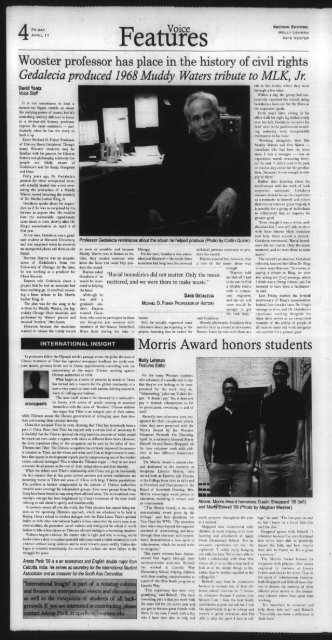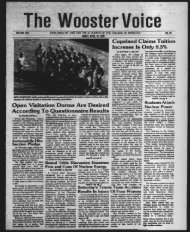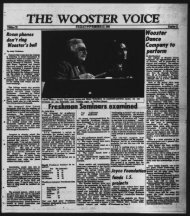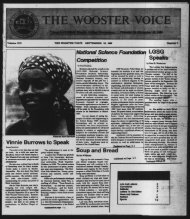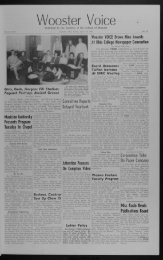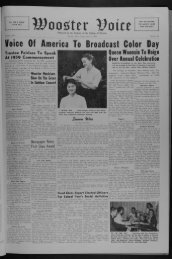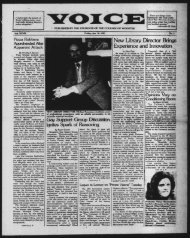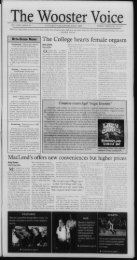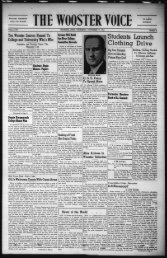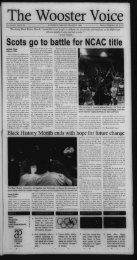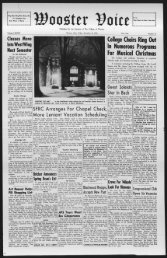ebrate inauguration - DRC Home - College of Wooster
ebrate inauguration - DRC Home - College of Wooster
ebrate inauguration - DRC Home - College of Wooster
Create successful ePaper yourself
Turn your PDF publications into a flip-book with our unique Google optimized e-Paper software.
4<br />
Friday,<br />
Features April<br />
1 1<br />
As protesters follow the Olympic torch's passage across the globe, the issue <strong>of</strong><br />
China's treatment <strong>of</strong> Tibet has captured newspaper headlines the world over.<br />
Last month, protests broke out in Lhasa, approximately coinciding with the<br />
"<br />
anniversary <strong>of</strong> the major Tibetan uprising against<br />
anoopparik<br />
Chinese authorities in 1959.<br />
What began as a series <strong>of</strong> protests by monks in Lhasa<br />
has turned into a concern for the global community; it is<br />
now a very sensitive issue with nations skirting around it,<br />
wary <strong>of</strong> ruffling any feathers.<br />
The issue itself seems to be obscured by a media-driv- en<br />
frenzy, with scores <strong>of</strong> people running to associate<br />
themselves with the cause <strong>of</strong> "freedom." Chinese authori<br />
ties argue that Tibet is an integral part <strong>of</strong> their nation,<br />
while Tibetans accuse the Chinese government<br />
dom and erasing their cultural identity.<br />
<strong>of</strong> infringing upon their free-<br />
China first occupied Tibet in 1949, claiming that Tibet has historically been a<br />
part <strong>of</strong> China. Since then Tibet has enjoyed only a certain ievel <strong>of</strong> autonomy. It<br />
is doubtful that the Tibetan spiritual identity; based on centuries <strong>of</strong> belief, would<br />
T T Section Editors:<br />
Molly Lehman<br />
Kate Vesper<br />
<strong>Wooster</strong> pr<strong>of</strong>essor has place in the history <strong>of</strong> civil rights<br />
Gedalecia produced 1968 Muddy Waters tribute to MLK, Jr.<br />
David Yontz<br />
Voice Staff<br />
It is not uncommon to hear a<br />
burned-o- ut hippie ramble on about<br />
the unifying power <strong>of</strong> music, but it's<br />
something entirely different to listen<br />
to a 65-year-- old history pr<strong>of</strong>essor<br />
express the same sentiment particularly<br />
when he has the story to<br />
back it up.<br />
Enter Michael 0. Fisher Pr<strong>of</strong>essor<br />
<strong>of</strong> History David Gedalecia. Though<br />
many .<strong>Wooster</strong> students may be<br />
familiar with his passion for Chinese<br />
history and philosophy, relatively few<br />
people are likely aware <strong>of</strong><br />
Gedalecia's<br />
and blues.<br />
zeal for banjo, bluegrass<br />
Forty years ago, Dr. Gedalacia's<br />
passion for these unexpected interests<br />
actually landed him a role overseeing<br />
the production <strong>of</strong> a Muddy<br />
Waters record honoring the memory<br />
<strong>of</strong> Dr. Martin Luther King, Jr..<br />
Gedalecia speaks about his experience<br />
as if he was as surprised by his<br />
fortune as anyone else. He recalled<br />
, how the .memorable opportunity<br />
came about in 1968, shortly after Dr.<br />
King's assassination on April 4 <strong>of</strong><br />
that year.<br />
At the time, Gedalecia was a graduate<br />
student at Harvard. University,<br />
and was surprised when he received<br />
an unexpected phone call from an old<br />
friend.<br />
Norman Dayron was an acquaintance<br />
<strong>of</strong> Gedalecia's from the<br />
University <strong>of</strong> Chicago. At the time,<br />
he was working<br />
Chess Records.<br />
as a producer for<br />
Dayron told Gedalecia about a<br />
project that he and an associate had<br />
been working pn. It involved recording<br />
a blues tribute to Dr. Martin<br />
Luther King, Jr.<br />
The plan was for the song to be<br />
written by Muddy Waters, the legendary<br />
Chicago blues musician, and<br />
performed by Waters' pianist and<br />
musical "brother," Otis Spann.<br />
However, because the musicians<br />
wanted to release the timely record<br />
'<br />
1 T<br />
u J<br />
V - ' ; i I TA "<br />
Pr<strong>of</strong>essor Gedalecia reminisces about the album he helped produce (Photo by Caitlin Quinn).<br />
as soon as possible, . and because<br />
Muddy Waters was in Boston at the<br />
time, they needed someone who<br />
knew the blues and could help produce<br />
the record.<br />
Dayron asked<br />
Gedalecia if he<br />
would be interested<br />
in helping<br />
the band.<br />
Although he<br />
was still a<br />
graduate student,<br />
Dayron<br />
trusted Geda- -<br />
lecia, who used to participate in blues<br />
and bluegrass jam sessions with<br />
members <strong>of</strong> the' famous Butterfield<br />
Blues band during his time in<br />
be wiped out even under a regime with ideals so different from theirs. However,<br />
the most important effect <strong>of</strong> the occupation can be seen by the influx non-Tibeta- <strong>of</strong><br />
into Tibet. The Chinese occupation has certainly improved the econom-<br />
J<br />
ns<br />
ic situation in Tibet, but for whom and what cost? Can an improvement in numbers<br />
that appear in development reports justify compromising one <strong>of</strong> the world's<br />
richest cultural heritages? This is what the Tibetans argue they do not want<br />
economic development at the cost <strong>of</strong> their independence and their identity.<br />
While the debate over Tibet's relationship with China can go on incessantly,<br />
the fact remains that at this point violent protests and severe crackdowns are<br />
becoming worse inJTibet and areas <strong>of</strong> China with large Tibetan populations.<br />
The problem is further compounded by the attitude <strong>of</strong> Chinese authorities<br />
towards news coverage by independent groups. Even news groups from Hong<br />
Kong have been forced to stay away from affected areas. The international community's<br />
outrage has been heightened by China's treatment <strong>of</strong> the issue itself,<br />
refusing to talk about it openly and multilaterally.<br />
As protests mount all over the world, the Tibet situation has caused rising ten-<br />
sions as the upcoming Olympics approach, which are scheduled to be held in<br />
Beijing. China's refusal to conduct dialogue with the Dalai Lama, Tibet's spiritual<br />
leader, or with other international leaders (China states that the entire issue is an<br />
internal affair), the protesters' use <strong>of</strong> violence and rioting and the refusal <strong>of</strong> world<br />
leaders to take a firm stance on Tibet are all contributing to a worsening situation.<br />
Violence begets violence. No matter who is right and who is wrong, world<br />
. leaders have a duty to conduct peaceful talks (and reach a viable solution) to curb<br />
violence without using violence and to work towards peace swiftly. Unless dialogue<br />
is initiated immediately, the world can include one more failure in the<br />
struggle for peace. . '<br />
Anoop Parik '09 is a an economics and English double major from<br />
Calcutta, India. He serves as secretary for the International Student<br />
Association and as treasurer for the South Asia Committee.<br />
"International Insight" is part <strong>of</strong> a rotating column<br />
and focuses on international events and discussions<br />
as well as the viewpoints <strong>of</strong> students <strong>of</strong> all. back<br />
grounds. If you are interested in contributing, please<br />
contact Anoop Parik at aparik09wooster.edu.<br />
Chicago.<br />
For his part, Gedalecia was astonished<br />
and flattered the iconic blues<br />
musicians had long been his personal<br />
"Racial boundaries did ndt matter. Only the music<br />
mattered, and we were there to make music"<br />
r<br />
David Gedalecia<br />
Michael 0. Fisher Pr<strong>of</strong>essor <strong>of</strong> History<br />
heroes.<br />
Still, he initially expressed some<br />
reluctance about participating in the<br />
project, insisting that he lacked the<br />
Molly Lehman<br />
Features Editor<br />
For the many <strong>Wooster</strong> students<br />
who volunteer, it's usually safe to say<br />
that they're not looking to be compensated<br />
for the work they do.<br />
"Volunteering," jokes one T-sh- irt slogan.<br />
"It doesn't pay." No, it does not<br />
pay instead, volunteerism is, for<br />
its participants, rewarding in and <strong>of</strong><br />
itself.<br />
Recently, two volunteers were recognized<br />
for their exceptional efforts<br />
when they were presented with the<br />
Morris Award by" the <strong>Wooster</strong><br />
Volunteer Network. On Thursday,<br />
April 10, a ceremony honored Marty<br />
Bidwell '09 and Dustin Sheppard '09<br />
for their volunteer work with children<br />
in two different elementary<br />
schools.<br />
The Morris Award is named after<br />
and dedicated to the memory <strong>of</strong><br />
Josephine Lincoln Morris, who<br />
served both as Emerita Life Trustee<br />
at the <strong>College</strong> from 1965 to 1974 and<br />
as President and Chairperson <strong>of</strong> the<br />
Board <strong>of</strong> Interfaith Housing. Mrs.<br />
Morris encouraged social justice in<br />
education, including<br />
as volunteerism.<br />
in venues such<br />
"The Morris Award is the only<br />
non-acade- mic award given by the<br />
<strong>College</strong>," said Kate Quinlivan '10,<br />
Vice Chair for WVN. "The awardees<br />
have taken steps beyond the expected<br />
standard <strong>of</strong> volunteering, and have,<br />
through their character and commitment,<br />
demonstrated a true spirit <strong>of</strong><br />
volunteerism, which the award seeks<br />
to recognize."<br />
This year's winners have demonstrated<br />
that legacy through their<br />
extracurricular activities. Bidwell<br />
has worked at Lincoln Way<br />
Elementary School, helping children<br />
with their reading comprehension as<br />
a part <strong>of</strong> the Ohio Reads program at<br />
Lincoln Way.<br />
"This experience has been very<br />
gratifying," said Bidwell. "The most<br />
rewarding part is that you work with<br />
the same kid for the entire year and,<br />
you get to become great friends with<br />
them. In my case, I work with a boy<br />
who I have been able to help and<br />
technical prowess necessary<br />
duce the record.<br />
to pro-<br />
Dayron assured him, however, that<br />
a love <strong>of</strong> the music, alone<br />
enough.<br />
was<br />
mm an -<br />
til M ta<br />
"Dayron told<br />
me that all I had<br />
to do was to find<br />
a reliable studio<br />
with a competent<br />
engineer,<br />
and my ear and<br />
taste would be<br />
enough to get<br />
' '" the task done,"<br />
said Gedalecia.<br />
Shortly afterwards, Gedalecia first<br />
met his idols in a hotel in downtown<br />
Boston. Later, he rode with them in a<br />
n<br />
cab to the studio, where they went<br />
through a few takes.<br />
Within a day, the group had successively<br />
executed the record, using<br />
Gedalecia's keen ear for the blues as<br />
the engineers' guide.<br />
Forty years later, sitting in his<br />
<strong>of</strong>fice with his right leg folded neatly<br />
over his left, Gedalecia recounts his<br />
brief stint in the pr<strong>of</strong>essional recording<br />
industry with recognizable<br />
excitement in his voice.<br />
"Working alongside men like<br />
Muddy Waters and Otis Spann<br />
musicians who had been my icons<br />
since I was a teenager was an<br />
experience worth treasuring forever,"<br />
he said. "I didn't need to be paid,<br />
or receive any credit for the production,<br />
because it was enough to simply<br />
be there."<br />
Rather than boasting about his<br />
involvement with the work <strong>of</strong> "such<br />
respected musicians, Gedalecia<br />
chooses instead to use the experience<br />
as a reminder to himself and others<br />
that even in times <strong>of</strong> great tragedy, it<br />
is possible for a group <strong>of</strong> individuals<br />
to collectively find an impetus for<br />
greater good.<br />
"Even though I was a white, middle-<br />
-class kid, I was still able to sit in<br />
with these famous black musicians<br />
and help them record a record," ,<br />
Gedalecia reminisced. "Racial boundaries<br />
did not matter. Only the music<br />
mattered, and we were there to make<br />
music." .<br />
The record's production, Gedalecia<br />
reflected, honored the fallen Dr. King<br />
in more ways than one. "In a sense, in<br />
paying a tribute to King, we were<br />
also acting out his message, which<br />
I think was a fitting tribute, and I'm<br />
honored<br />
he said.<br />
to have Ijeen a facilitator,"<br />
Last . Friday marked the fortieth<br />
anniversary <strong>of</strong> King's assassination.<br />
Indeed, four decades later, Dr. King's<br />
message is alive, and Dr. Gedalecia's<br />
experience working alongside his<br />
blues idols serves as an exceptional<br />
example <strong>of</strong> the ability <strong>of</strong> people <strong>of</strong><br />
all races to unite and work alongside<br />
one another for a greater goal.<br />
Morris Award honors students<br />
Above, Morris Award honorees. Dustin Sheppard '09 (left)<br />
and Marty Bidwell '09 (Photo by Meghan Meeker).<br />
watch progress throughout the year<br />
as a student." .<br />
Sheppard also volunteered with<br />
'children in need, helping with their<br />
learning and schoolwork at Apple<br />
Creek F.lemcntary School. "It's an<br />
awesome experience for me," he<br />
explained. "I really enjoy hanging<br />
out with the kids. We've been able to<br />
build a relationship with them that<br />
alovs all <strong>of</strong> us to take a step back to<br />
look at all the simple things in life,<br />
rather than be totally engulfed in the<br />
college life."<br />
Bidwell says that - he volunteers<br />
because it reminds him <strong>of</strong> how different<br />
others' lives can be. "I choose<br />
to volunteer because I realize how<br />
blessed I am. I have the best family<br />
and friends anyone can ask for, I had<br />
the opportunity to go to college and<br />
receive a great education and I'm<br />
able to play the sport I love in col<br />
J7<br />
1<br />
lege," he said. "The list goes on and<br />
on, but I know for a lot <strong>of</strong> kids this<br />
isn't the case."<br />
Sheppard agrees with Bidwell. "I<br />
volunteer bucause I've seen firsthand<br />
how we've been able to positively<br />
impact the kids, and how they've<br />
been able to impact us. It's a great<br />
experience."<br />
The Morris Award honors its<br />
recipients with plaques, their names<br />
engraved in markers at Lowry<br />
Center and checks for $150. True to<br />
the spirit <strong>of</strong> volunteerism, however,<br />
both Sheppard and Bidwell have chosen<br />
to donate the entirety <strong>of</strong> their<br />
allotted prize money to the elementary<br />
schools where they spent time<br />
working.<br />
"It's important to volunteer and<br />
help these kids out," said .Bidwell.<br />
"You really can make a difference in<br />
their lives."


